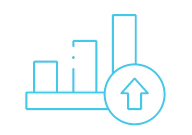Maryland Primary Care Program
The Maryland Primary Care Program (MDPCP) is a statewide program that provides financial support to primary care practices to promote care management and care coordination to improve health outcomes for your patients. MDPCP includes two track options - an upside-only risk model (Track 2) or a downside risk option for more advanced primary care practices (Track 3). Participating in either track of MDPCP:
Provides a Guaranteed, Prospective Care Management Fee for attributed Medicare patients for:

tools to enhance practice efficiency and effectiveness

Improving care coordination for rising risk patients

Multi-disciplinary staffing to better manage care for complex patients
Increases Your Practice Revenue
 Eligibility for Advanced Alternative Payment Model (AAPM) status offers a higher increase in Medicare Part B payments for payment year 2025, and eliminates MIPS reporting requirements
Eligibility for Advanced Alternative Payment Model (AAPM) status offers a higher increase in Medicare Part B payments for payment year 2025, and eliminates MIPS reporting requirements Performance-based incentives provide payment based on attributed beneficiary count. The amount paid is $4.00 per member per month. Upside risk only.
Performance-based incentives provide payment based on attributed beneficiary count. The amount paid is $4.00 per member per month. Upside risk only.  Practices have the ability to capture “fee for value” payments associated with care coordination work such as transitional care visits and collaborative care
Practices have the ability to capture “fee for value” payments associated with care coordination work such as transitional care visits and collaborative careOffers Advantages not Available Through ACOs
Choosing to participate in MDPCP creates a great opportunity for practices interested in value-based care focused on care management enhancements that result in practice level investment and rewards.
| ACO | MDPCP | |
|---|---|---|
| Care management funding | No direct support | Prospective quarterly payment based on track and attributed patient risk scoring |
| Performance-based payments | Retrospective, paid for ACO-wide performance | Prospective, paid for practice-specific performance |
| Risk model | Downside risk | Upside only risk in Track 2 with downside risk applied to practices in track 3 |
| Payment for social needs | No direct payment | Nation’s first direct payments for patients with both medical and social needs called the Health Equity Advancement Resource and Transformation (HEART) payments that are no subject to risk |
